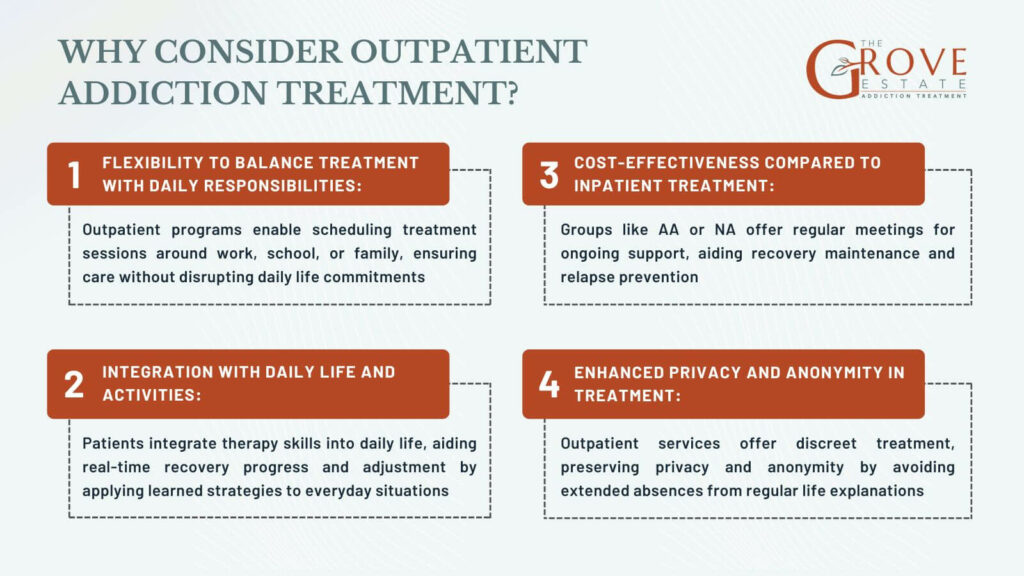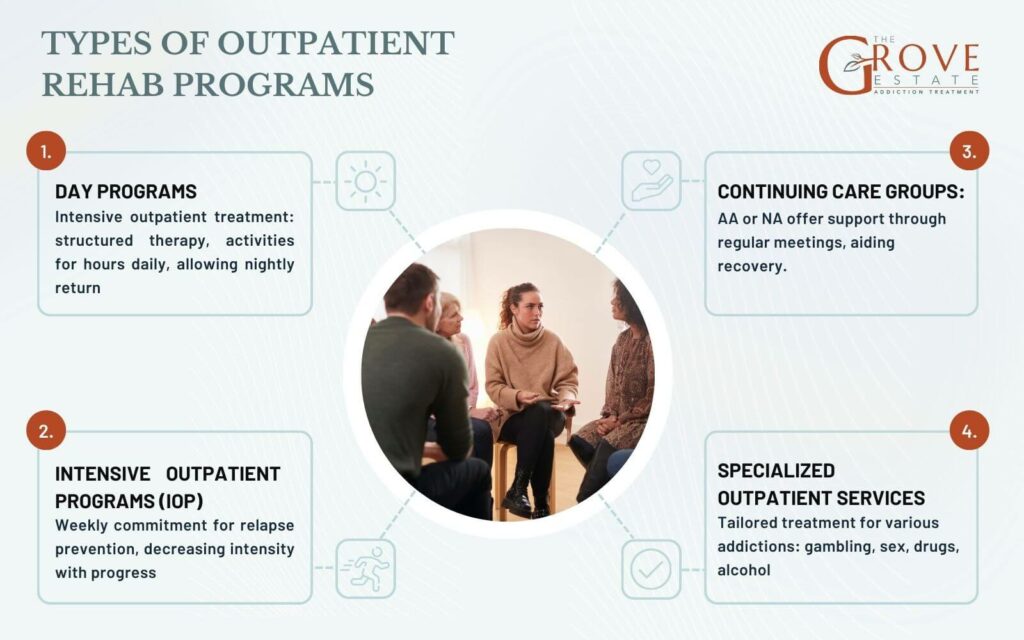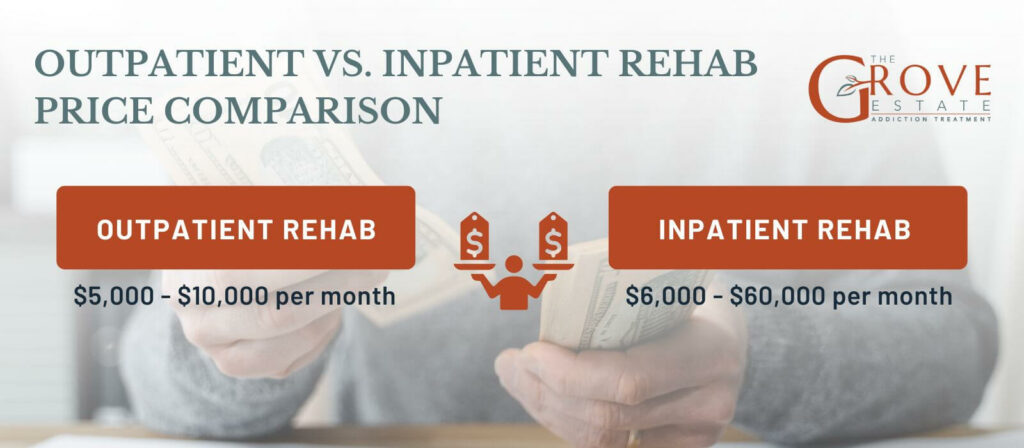Outpatient rehab is an ideal option for people who are motivated to stop using drugs or alcohol but require the flexibility of a program that will work around their daily schedules. According to the Substance Abuse and Mental Health Services Administration (SAMHSA), approximately 3.2 million Americans sought outpatient rehab services for substance use disorders in recent years. This form of rehabilitation offers individuals the opportunity to receive necessary care and therapy while maintaining their daily routines, making it an integral component in the spectrum of addiction recovery strategies.
The flexibility of outpatient addiction treatment enables individuals to receive therapy while maintaining work, school, or family commitments. Sessions are often scheduled around personal schedules, allowing for a balance between treatment and daily life.
There are different types of outpatient programs, from standard, with a few hours of therapy weekly, to Intensive Outpatient Programs (IOP) and Partial Hospitalization Programs (PHP), which provide more intensive, frequent sessions. Each type is designed to cater to different levels of need while allowing patients to live at home.
The primary benefits of outpatient treatment include affordability and the ability to stay in one’s environment, creating a balance between treatment and everyday life. It offers the advantage of applying learned coping strategies directly to real-life situations, aiding in sustained recovery.
What Is Outpatient Addiction Treatment?
Outpatient addiction treatment is a rehabilitation approach that provides therapy and medical care for substance use disorders while allowing individuals to reside at home. This form of treatment offers flexible scheduling, personalized treatment plans, and varying levels of intensity based on individual needs.
Outpatient treatment differs from traditional inpatient rehab because residential treatment requires a stay at the facility, lasting from weeks to months, offering 24-hour medical and therapeutic support in a distraction-free environment focused on recovery.
On the other hand, outpatient rehab allows individuals to live at home and maintain daily routines and responsibilities. These programs vary in intensity and services, including counseling and group sessions, making them more suitable for those with mild to moderate issues or those needing ongoing support post-inpatient care. Both inpatient and outpatient rehab programs have their place in the continuum of care for addiction and mental health treatment. The choice between them depends on the individual’s specific situation, the severity of their condition, their support system, and their daily responsibilities.
Why Consider Outpatient Addiction Treatment?

Outpatient rehab is a great choice for individuals with mild to moderate addiction problems, those with a strong support system at home, or individuals transitioning from inpatient treatment needing continued support. Here are the key reasons to choose outpatient addiction treatment:
- Flexibility to balance treatment with daily responsibilities: Outpatient programs allow individuals to schedule treatment sessions around their work, school, or family commitments, offering a way to receive care without disrupting daily life.
- Integration with daily life and activities: Patients can apply the skills and strategies learned in therapy directly to their everyday situations, facilitating real-time recovery progress and adjustment.
- Cost-effectiveness compared to inpatient treatment: Outpatient care eliminates the need for overnight stays, making it a more affordable option while still providing high-quality treatment and support.
- Enhanced privacy and anonymity in treatment: Outpatient services enable individuals to receive treatment discreetly, without having to explain a prolonged absence from their regular life, thus maintaining their privacy and anonymity.
What are the Types of Outpatient Rehab Programs?

The realm of outpatient addiction treatment is diverse, offering a variety of programs designed to meet the unique needs and circumstances of each individual seeking recovery. These programs are structured to provide the necessary support and flexibility, allowing patients to continue with their daily lives while undergoing treatment. Here is an overview of the various types of outpatient rehab programs available:
- Day Programs: The most structured form of outpatient treatment, offering several hours of therapy and activities during the day, multiple days a week, allowing patients to return home at night.
- Intensive Outpatient Programs (IOP): These programs require a significant time commitment per week, focusing on relapse prevention and the ability to maintain daily responsibilities. Treatment intensity decreases as individual progress is made.
- Continuing Care Groups: Groups like Alcoholics Anonymous or Narcotics Anonymous provide ongoing support through regular, scheduled meetings, helping individuals sustain their recovery and avoid relapse.
- Specialized Outpatient Services: Tailored to specific addictions, such as gambling, sex, drugs, or alcohol, these services offer targeted treatment and support, addressing the unique challenges of each type of addiction.
How Does Outpatient Addiction Treatment Work?
When enrolled in outpatient rehab, individuals live at home and visit the facility for treatment sessions, with the level of commitment varying across programs. Some may require just a few hours per week, while others necessitate several hours daily, often including medical care and prescription medications. Before starting, patients undergo an assessment to create a personalized treatment plan, setting goals to enhance therapy effectiveness. This involves discussing substance use, medical history, mental health, family dynamics, and employment among other factors.
The established treatment plan also comes with specific program rules, such as regular drug tests to ensure abstention from substance use during treatment. Participants are expected to attend regular therapy sessions, which are central to the outpatient model, integrating individual, group, and family therapy to address various aspects of addiction. Additionally, medication-assisted treatment (MAT) may be used to manage withdrawal symptoms and cravings, integrating medical and therapeutic support to facilitate recovery while allowing individuals to maintain daily routines.
What Are the Benefits of Outpatient Rehab?
Outpatient rehab offers the advantage of maintaining employment and family life, as it doesn’t require an extended stay away from home or work. This setup enables individuals to stay connected with their family and home environment, avoiding the disconnection that can occur with inpatient treatment. Financially, outpatient programs are often more viable, presenting a cost-effective solution that is generally more affordable than inpatient options and is usually covered by insurance.
Outpatient rehab offers diverse therapy options, catering to the specific needs and circumstances of each person, and includes psychiatric care when needed. It facilitates access to existing support networks and helps in building new ones by providing outreach resources, such as contact information for support groups and connections to sober peers. This supportive environment fosters motivation and encouragement, enabling individuals to enhance their quality of life while actively working on their recovery journey.
What are the Challenges of Outpatient Treatment?
Outpatient treatment has its challenges. The risk of exposure to triggers in familiar environments can be significant, emphasizing the need for a supportive home environment to facilitate progress. It’s crucial for those undergoing outpatient care to assess their situation continually and consult with a professional to determine if a higher level of care is necessary, ensuring they receive the appropriate support for their recovery journey.
What is the Cost Difference with Outpatient vs. Inpatient Rehab?

Outpatient rehab is generally more cost-effective compared to inpatient rehab, with expenses varying based on the frequency and type of services provided. Insurance often covers a portion of outpatient treatment, and many programs offer sliding scale fees or financial assistance to help manage costs. Assessing insurance coverage, exploring financial assistance options, and evaluating personal budget constraints are crucial steps in determining the most suitable and affordable treatment path.
The cost of outpatient and inpatient rehab can vary widely depending on location, facility, and the specifics of the treatment program. For example:
- Outpatient rehab costs can range from $5,000 to $10,000 for a three-month program, depending on the frequency and duration of sessions.
- Inpatient rehab might cost between $6,000 and $20,000 for a 30-day program, with longer stays and luxury facilities costing significantly more, potentially upwards of $30,000 to $60,000 for the same duration.
These costs are influenced by factors like the level of care provided, the type of facility, and additional services such as individual therapy sessions or medical detox. Insurance coverage can significantly reduce out-of-pocket expenses. Individuals lacking insurance or who require assistance with initial expenses can explore government-funded grants and scholarships, which are accessible to eligible candidates. Additionally, some rehab centers offer financing options or collaborate with third-party lenders to facilitate payment. Communicating directly with the outpatient treatment facility is crucial to understand the available payment methods and financial support they offer.
Is Outpatient Rehab Right For You?
Determining if outpatient rehab is the appropriate choice involves assessing your addiction’s severity, the strength of your support system, and your personal commitment to recovery. Understanding the extent of your addiction helps in deciding whether the structured yet flexible nature of outpatient treatment aligns with your needs. Success in outpatient rehab is heavily reliant on personal commitment, as the individual must be motivated to actively participate in the treatment process while managing daily responsibilities.
How to Find the Right Outpatient Addiction Treatment Center?
When searching for an outpatient addiction treatment center, consider the types of programs offered and ensure they align with your specific needs. Look for centers with a strong reputation, accredited facilities, and qualified staff with expertise in treating your particular addiction. Accessibility is also crucial, so consider the location and scheduling flexibility.
Here are some questions to ask outpatient addiction treatment centers:
- What types of addiction treatment programs do you offer?
- What are the qualifications of your staff and therapists?
- How do you tailor treatment plans to individual needs?
- Can you provide examples of your program’s success rates?
- What kind of support and aftercare do you provide to prevent relapse?
To evaluate the quality of an outpatient program, review the center’s accreditation and credentials, which signify adherence to established standards and quality care. Investigate the program’s success rates and ask for testimonials or references from past clients. Understand the treatment methodologies used and ensure they are evidence-based. Additionally, consider the ratio of staff to patients to ensure you will receive adequate attention and support.
What are the different therapies used in outpatient treatment?
Outpatient treatment incorporates various therapies to address addiction and related issues. Common therapies include Cognitive Behavioral Therapy (CBT) for altering negative thought patterns, Dialectical Behavior Therapy (DBT) for emotional and relational skills, Motivational Interviewing (MI) to enhance motivation for change, and family therapy to improve relationship dynamics. Additionally, group and family therapy sessions provide peer support, while individual therapy allows for personalized care.
What is an IOP?
An Intensive Outpatient Program (IOP) is a form of outpatient treatment that provides a structured therapy environment without requiring hospitalization. IOPs offer a higher level of care than standard outpatient services, involving several hours of treatment per day, multiple days a week. IOPs are designed for those needing more support than regular outpatient care but less than inpatient treatment.
How to deal with cravings and triggers during outpatient treatment?
To manage cravings and triggers during outpatient treatment, identify triggers, consider medication if necessary, stay engaged in therapy sessions, build a supportive network including finding a sponsor, maintain a healthy lifestyle, and go to an AA or NA meeting when a craving arises. Consistently applying these strategies can help navigate challenges and reduce the impact of cravings and triggers on recovery.
What are the main differences between outpatient and inpatient addiction treatment?
The main differences between outpatient and inpatient addiction treatment lie in the setting, intensity, and duration of care. Outpatient treatment allows individuals to live at home and maintain a regular daily routine, attending treatment sessions at scheduled times. This type of treatment is beneficial for those with mild to moderate addiction issues or as a step-down from more intensive inpatient care. Outpatient treatment is often seen as a continuation of the recovery process, providing ongoing support while reintegrating into everyday life, a critical phase that might benefit from exploring residential addiction treatment options for more severe cases.
In contrast, inpatient or residential treatment requires patients to stay at a treatment facility, offering 24-hour care and support. This environment is structured to remove individuals from potential triggers in their home environment, focusing entirely on recovery without the distractions or stresses of outside life. Inpatient programs are typically more intensive and suitable for those with severe addiction issues or those who have not been successful with outpatient treatment. For individuals needing targeted help for underlying mental health conditions along with addiction, dual diagnosis treatment can provide the comprehensive care required to address both aspects simultaneously.

Share This Post



